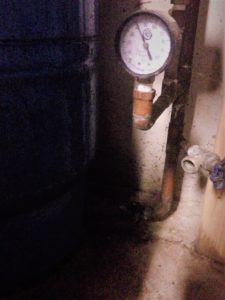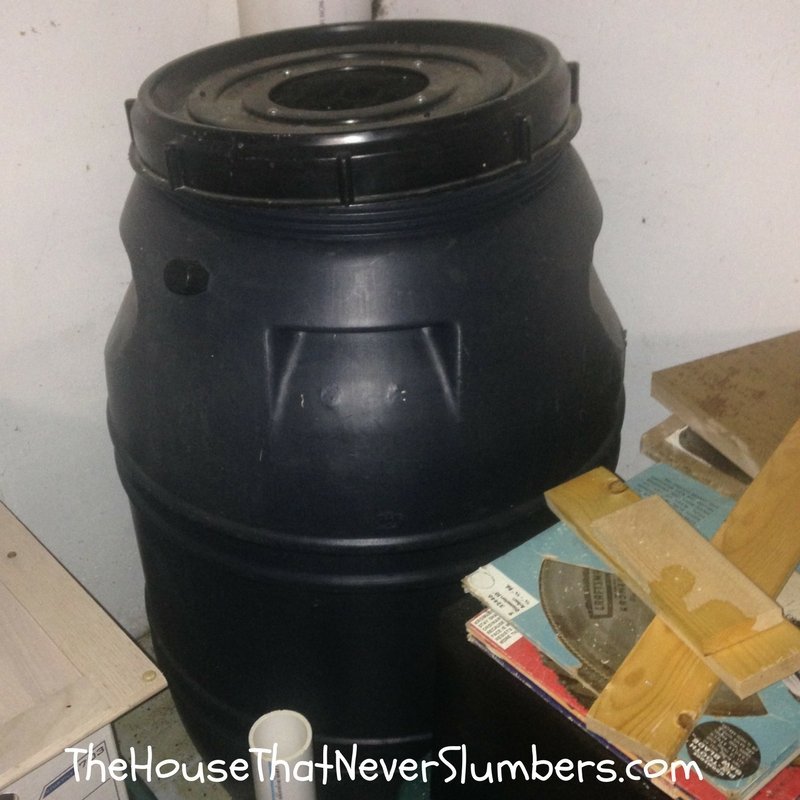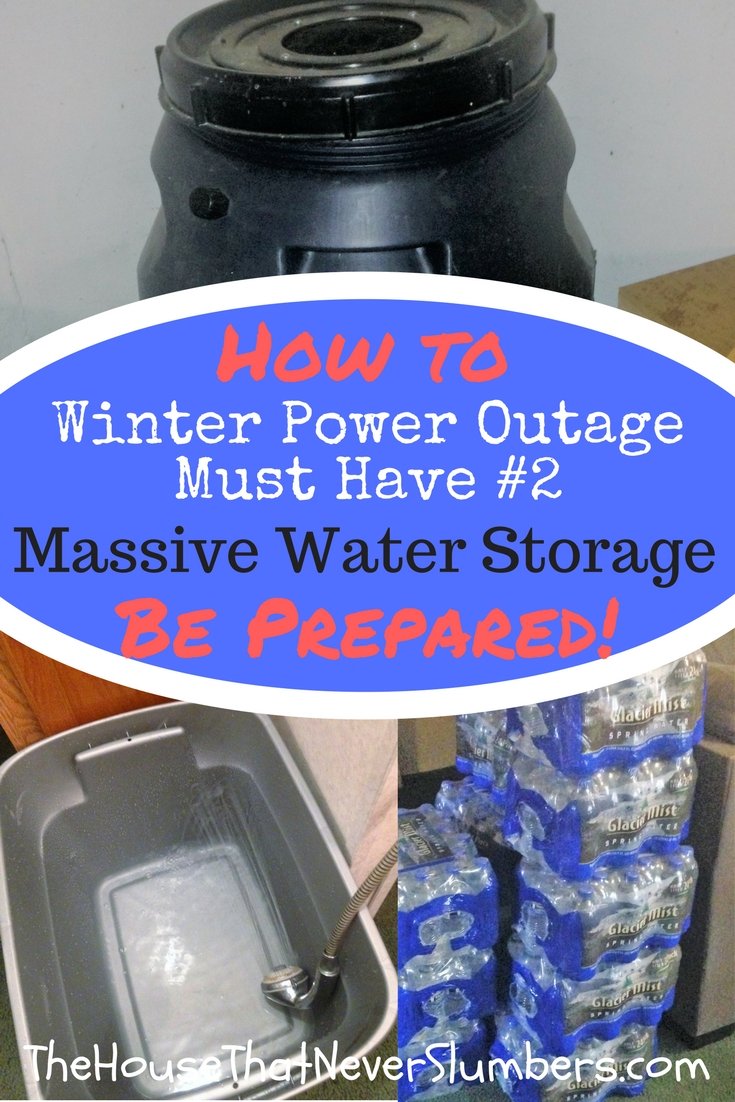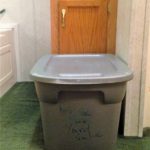
Winter Storm Preparedness – Massive Water Storage on the Cheap –
In order to protect and provide for your family in any winter storm power outage, you must have adequate water storage. Experts consider one gallon of water per person per day to be an appropriate level of water supplies. For a large family, that’s a lot of water! Keep in mind any animals will also need water. Fortunately, I came up with an ingenious way to store massive quantities of water at a very low cost.
For those of you who read How to Avoid a Winter Power Outage by Being Prepared, I know we’re going out of order by posting about Winter Power Outage Must Have #2 Massive Water Storage before #1 Alternative Heat without Electricity, but I wanted to cover water storage as soon as possible. Some of my water storage methods are ideas you could implement almost immediately, while my alternative heat sources are not something you could take care of this weekend.
*This post contains affiliate links.
Diversify Your Sources
We don’t just rely on one form of water storage here. I like to diversify our water stores. During a power outage, our well does not pump water. I know people on city water gravity-fed from a water tower still have water for a time while that tower is full, but even those in the city could be without water in an extended outage. In a very cold weather spell, many people have to worry about pipes freezing and bursting. In a power outage, the source of heat many use to keep their water from freezing is often eliminated, so this can create its own set of issues.
Whether you are in the city or in the country, whether you are on a well or on municipal water, you should have some form of water storage in your home at all times. There are a variety of emergency issues that could interrupt your usual means of getting water. Just because the most common interruption of our water supply has been power outages during winter ice storms, doesn’t mean something couldn’t happen at other times of the year. Do not be caught without some way to get water in an emergency!
In an emergency, you need water for drinking, cooking, washing, and flushing. When you factor in all those functions, you can’t get by with just a couple of 16-ounce bottles of water per person per day. You need much more water than that. However, it is nice to have a decent supply of bottled drinking water on hand too.
Bottled Water
I know this stack of water looks like we’ve been preparing for a natural disaster, but this is actually just the way we normally buy water. Remember, there are seven people living here.
We always buy bottled water ten cases at a time. Our Menards carries this spring water for $1.99 per case as the regular price. Sometimes they also offer a rebate if you buy ten cases. You cannot beat this price. We don’t normally leave it stacked in the living room. We drive the van down to the basement walkout entrance and stack it in the basement kitchen most of the time, but it had been raining for days, and the ground was too wet for that this week, so I still have eight cases of water sitting in the family room at the moment. I try to remember to carry one down every time I make a trip to the freezer.
Water in the Pipes
We do still have water in the pipes when the power goes out, and we can still run some water from the faucets while the tank still has enough pressure. It’s a limited amount of water though. I don’t know if this is common practice, but the company that dug our well always puts one of these little faucets next to the pressure tank in a basement. It allows us to get every last drop of water from the pipes upstairs if needed.
Ignore the messy cobwebs in my pump room, but here’s what you should look for if you want to check to see if your house has this feature.

We’ve never actually had to access this feature because I’ve always had enough other water, but it’s nice to know it’s there anyway.
Tubs of Water
I inherited this tip from my grandma. If there was a storm predicted, you would find tubs of water all over her house. She would have dishpans of water sitting in the kitchen and wash basins full of water sitting in the bathroom. My grandparents had this old clawfoot bathtub, and she would fill it with water for any potential power outage. That tub had one of those rubber drain plugs, and somehow the water stayed. My drain plugs do not hold the water overnight. I’ve tried. I have a huge garden tub in my master bathroom. I filled it for the first storm the first year we lived here. By morning, it was empty. I wasted a lot of electricity filling that tub.
I could get something like this, but it’s more expensive than I would be willing to pay.
I just use plastic tubs instead. They are cheap. I have detachable sprayers on all my showers, so I was able to easily fill this tub and then push it to the corner of my bathroom. I plan to leave it sitting there through the rest of the bad weather months. The cabinet door it’s blocking just holds our beach towels.
Jugs of Water
I keep a few gallon jugs of water on hand too for cooking. I picked up five of them when I got groceries a few nights ago. When we had goats and chickens I would save all the two-liter pop bottles from dinners at our church and youth group. I would fill those with water and store them under the utility sink in our basement. My grandma would always have several recycled milk jugs full of water sitting in her garage during winter, so I guess I inherited that practice as well.
Rainbarrel Water Storage
My most ingenious plan for storing massive quantities of water really cheap was my own idea. Several years ago our county had a grant that allowed one of the agencies (I think it was the Solid Waste Division.) to give away a free rain barrel to anyone who attended a workshop about using the rain barrel.
I know they gave me the rain barrel because I was supposed to be using it for my garden, but I had other plans for it. I had been shopping online for a huge water storage tank to keep in my basement for emergencies, but those containers are extremely expensive.
You can check out this water storage tank if you want to know just how expensive.
I figured this plastic rain barrel can hold water just as well as any of the ones that cost hundreds of dollars.

I realize this barrel is likely not made of food-safe plastic. I do not plan on having to drink the water held by this rain barrel. I keep this water on hand in case we would need to wash clothing or flush toilets with it. The top lid is not solid. It’s just a screen, but I just put a piece of clear plastic over the top and screw the lid that holds the screen in place over that.
I treat the water stored in this container with bleach. The Water Quality and Health Council recommends 1/8 teaspoon of non-scented bleach per gallon of water. You can find those guidelines and other water storage tips here.
Probably the best feature of this rain barrel is that it has a threaded water spout at the very bottom. I can attach a pocket hose to that spout in the spring and empty that water onto my garden. Then I don’t feel like I wasted 50 gallons of water.
A few years after I received this first barrel for attending the workshop, the county made the barrels available again to residents for $20 each without attending a workshop. I bought two more barrels then. I now use one outside in the summer for its actual intended purpose.
It might be worth checking with your county to see if they have any programs that offer free or low-cost rain barrels to residents. There are also a variety of rain barrels available on Amazon. Although they are higher than I would want to pay, it’s still less expensive than buying the special water tanks. The one below is a very basic model. There are more decorative ones for higher prices. Some look like pottery. Some look like whiskey barrels. I would actually love to swap mine for a fancier looking one, especially if we ever get the basement to the point of looking more finished.


Plan According to Your Needs, and Adjust as Those Needs Change!
The needs of each family change over time. It’s important to adjust to those needs. We don’t currently have any livestock or poultry here, but when we did, we needed to be prepared for the needs of those animals two. I never needed to store water for mixing formula because I only breastfed. I just needed plenty of drinking water for me in the years when we had babies, but someone with an infant on formula would definitely need to adjust their water storage for that.
I didn’t actually have to fill my rain barrel water storage this year because our church now has a standby generator. Our church wanted to have the capability of serving as an emergency shelter during power outages. We wanted the community to have access to heat and water in the event of an interruption in the power grid.
Since we live within walking distance from the church, I know that we will be able to get water there now if our home is without power for several days. Even if the weather is too bad for us to drive very far, we will still be able to make it to the church where we have access to heat, a full kitchen, and bathroom facilities. This significantly reduces our water storage needs here, but I still like to have a substantial amount of stored water on hand because we would likely not be the only family needing to access the church facilities.
Also check out Winter Power Outage Must Have #1 Alternative Heat and #3 Non-Perishable, Easily-Prepared Food.
Don’t let your friends be unprepared! If you found this post helpful, please like, share, tweet, pin, follow, and/or subscribe!











the rain barrel idea is genius. I had several hooked up before I installed underground drain tile to the gutter downspout. I still have them and I will do this next winter.
The rain barrel has been a great way to store a lot of water. We have livestock that have to be watered too. The way the winter storms impacted livestock in Texas makes me really thankful we’ve been prepared for winter power outages.
These are all great ideas, but I think your best one is to diversify! That is an excellent approach. Great post! I’ve pinned it, too. 🙂
Thanks for pinning. I agree. Diversifying your stores is always the best strategy. The first rule of preparation is “Always have a backup for your backup.” Having a variety of options really helps with that, but it also makes me a bit of a hoarder.